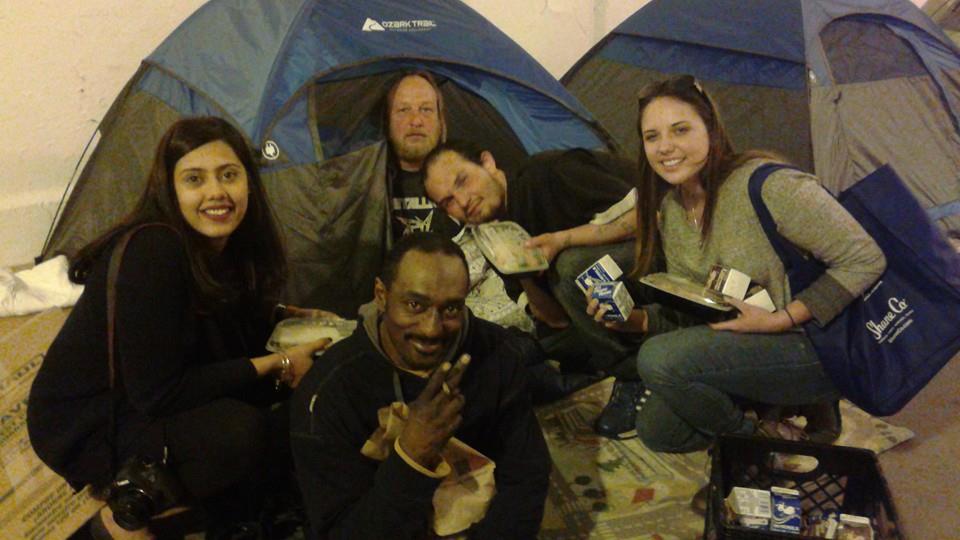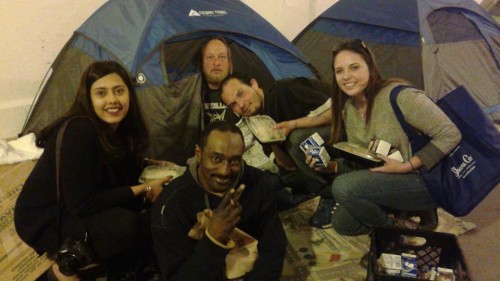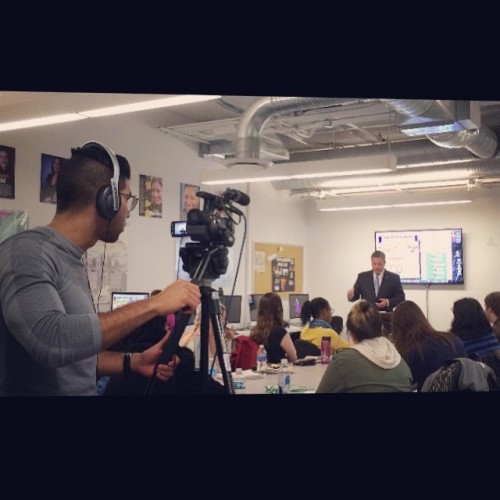
What To Know Before Coming to Columbia

While out looking for sources for a story about homeless voting, Journalism MA students Saiyna Bashir and Devon Marti help feed the homeless with Caroly Boyd, CEO of Humble Hearts Organization.
Yesterday was Admitted Student Day at Columbia College Chicago for our admitted journalism graduate class of 2016. Before today, I sat down and tried to think about everything I wished I were told before coming to Columbia—the financial aide process, what I needed to know before starting class, what I should prepare with, etc.
I decided then that I would bestow my knowledge upon these prospective new students about the ins-and-outs of our program, from my perspective. I didn’t want to just give them the same old tired speech of “this program is great, come join us and we will help prepare you for a job in the field.” While this statement is true—Columbia’s Journalism, MA program is excellent at getting you connections and opportunities—I wanted to tell them what it is really like to go to Columbia and what tips I could share with them before they begin their journeys in this program.
I decided the best way to do this would be to have all of our current graduate students join the admitted students and I for lunch. As we all sat down to eat, I figured the best way to jump right into things was for all of us to say our names, where we are from, and what area of journalism we want to pursue (the typical first grade icebreaker).
As we all began to talk and the environment became more laid back, the current graduate students and myself began to recall everything we all wished we had been told before starting the program and started to give some of the best advice I have heard for students thinking about coming to Columbia. Here is the break-down for all of you:
1. Get on your smart phone and download every new source application in the city of Chicago, and read the alerts every day. Reporting on public affairs in the Chicago involves knowing all of the public affairs that go on in the city, as well as all of the politicians and organizations that are involved with them. It may sound simple but in order to produce great news, you need to read the news yourself.
2. Start learning how to use Photoshop and Final Cut Pro 10. While in Jackie Spinner’s Digital Journalism class during the Fall semester, you will be taught the basics of these, but after that you are on your own to figure out how to edit your photos and videos. The best way to learn how to use these applications without having to spend the money to purchase them is to watch the tutorials on www.lynda.com. There are also tutorials on YouTube you could watch as well. Learning the basics before you are in Professor Spinner’s class will help you have more time to focus on learning how to shoot video and photos.

Journalism MA student Michael Esparza shooting Illinois State Rep. Robert Martwick (D-Norridge) while speaking to an undergraduate journalism class at Columbia College Chicago
3. Start learning how to shoot videos and photos, and start looking into the equipment to buy now. If you do not own a DSLR camera, I advise you to start looking into purchasing one. Under the equipment guide for our program, it states the equipment you will need for the Digital Journalism class. While it may seem like a lot of money to be spending, this equipment will be used throughout your whole time at Columbia, as well as into your career. Having the equipment before starting the class will allow you time to become familiar with it, especially your camera. This will allow you to jump right into the assignments you are given in the class. You will be taught more tips and tricks from Professor Spinner, but the more comfortable you are with your camera when you begin your class with her, the easier it will be to learn more.
4. Time management in this program will be your best friend, and so will your passion for this career path. As important as it will be for you to make sure you make enough time to find sources, interview those sources, write up your stories, edit them, get photos or video for those stories, and sleep, it is equally important that you are passionate about this field of work. Otherwise, it can become too much. This program is extremely hands-on, it is a lot of work, but it is so incredibly worth it. In our program you will become the best possible journalist that you can be and it will help you in your future career.
This program does not ask you to be the world’s greatest writer, photographer or editor, but it does ask you to improve your skills in these areas. This is what our program has that others do not—we make you the most well rounded journalist we can. When you leave this program you will know how to shoot videos and photos, how to pitch and write a full news-worthy story, how to edit your photos and video in Final Cut Pro and Photoshop, and you will have a rolodex full of sources. You will make connections through our faculty and your cohort, as well as the ones you yourself make on your own. You will leave this program with the confidence of knowing you can go out and cover a news story with the best of them, because you are now one of them.
